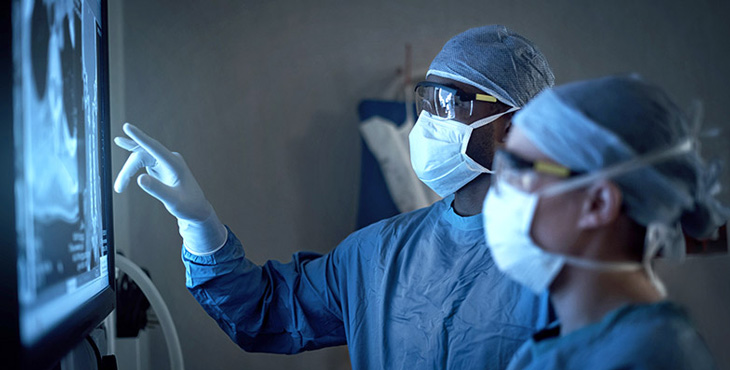
About
At Gibbs Cancer Center, our cancer surgery specialists (surgical oncologists) recognize that each person who experiences cancer is unique, and we offer both technical expertise and genuine warmth and concern as we tailor a plan for your treatment and recovery.
Many of our surgical oncologists have fellowship training that provides an additional level of skill and experience in treating a particular type of cancer.
In many cases, surgically removing a tumor is the most effective means of treating cancer. Sometimes, your surgeon may recommend surgery in combination with chemotherapy or radiation therapy.
Throughout your treatment, our doctors and staff will answer your questions and do everything possible to make you feel confident and comfortable about the care you are receiving.
Why Surgical Oncology at Gibbs Cancer Center?
Our highly-trained surgeons are equipped to tackle both straightforward and complex cases. The overall approach to cancer treatment at Gibbs Cancer Center brings surgical oncologists together with other specialists to create your care plan, based on the combined expertise and experience of the group.
Gibbs Cancer Center has multiple unique cancer programs, each with a focus on a particular type of cancer—breast, lung, prostate, leukemia and others.
Each cancer team meets weekly, gaining insights from surgeons, medical oncologists, radiation oncologists, nurse navigators, and multiple other specialists all working together to customize your treatment plan. This is known as multidisciplinary care.
In addition, our surgical oncologists are involved in clinical research trials that may give you added options for care.
We have a long tradition of treating cancer in our region, and since 1938, we have received continuous accreditation by the Commission on Cancer of the American College of Surgeons for our commitment to providing high-quality, multidisciplinary, patient-centered cancer care.
Minimally Invasive Surgery
Advantages of minimally invasive surgery include less pain, less bleeding and scarring, a shorter recovery time and quicker return to your normal activities. Although open surgery may be required in some cases, our surgeons strive to use the least invasive technique.
Our doctors perform minimally invasive surgery in the abdomen (laparoscopy) and the chest (thoracoscopy) using small incisions through which they insert a small scope with a camera and thin surgical instruments. The camera creates sharp images on a television screen to guide doctors as they remove a tumor.
Gibbs Cancer Center established one of the first robotic surgery programs in South Carolina and continues to be one of the largest programs in the state for robotically treating prostate, gynecologic and other cancers. Robotic-assisted surgery is especially effective in removing tumors from hard-to-reach areas. The surgeon sits at a console and views 3D, high-definition images of internal structures in order to direct small robotic instruments to perform complex, delicate procedures.
Reconstructive Breast Surgery
Reconstructive breast surgery is an important option for women who have undergone breast cancer treatment that included the removal of breast tissue. Reconstruction can provide these patients with a sense of their return to health and well-being. The DIEP flap can be performed at the time of mastectomy, or weeks to years after mastectomy. It is also extremely successful following prior radiation.
Our surgeons perform procedures at the Gibbs Cancer Center in Spartanburg and at Pelham Medical Center in Greer.












